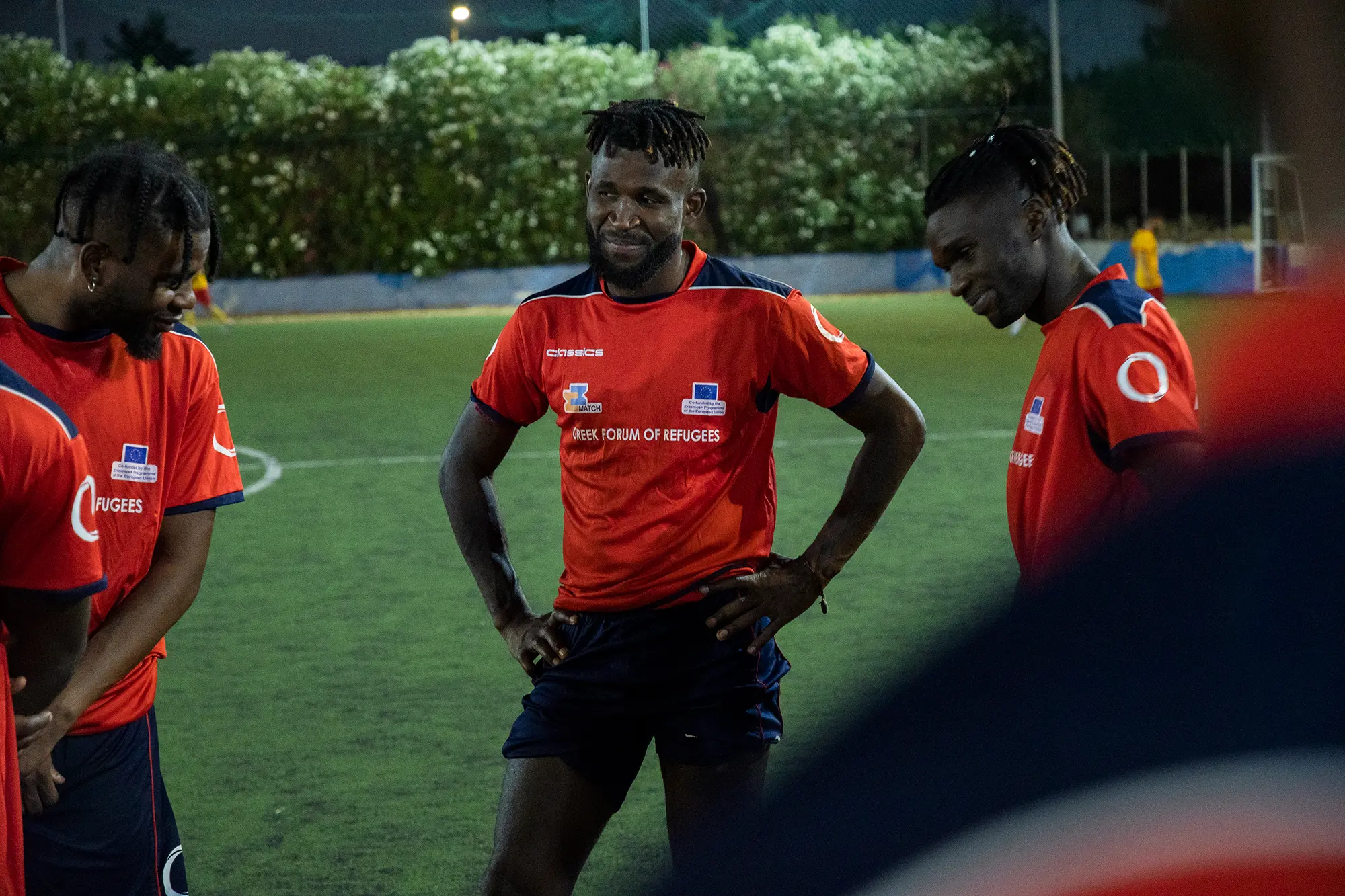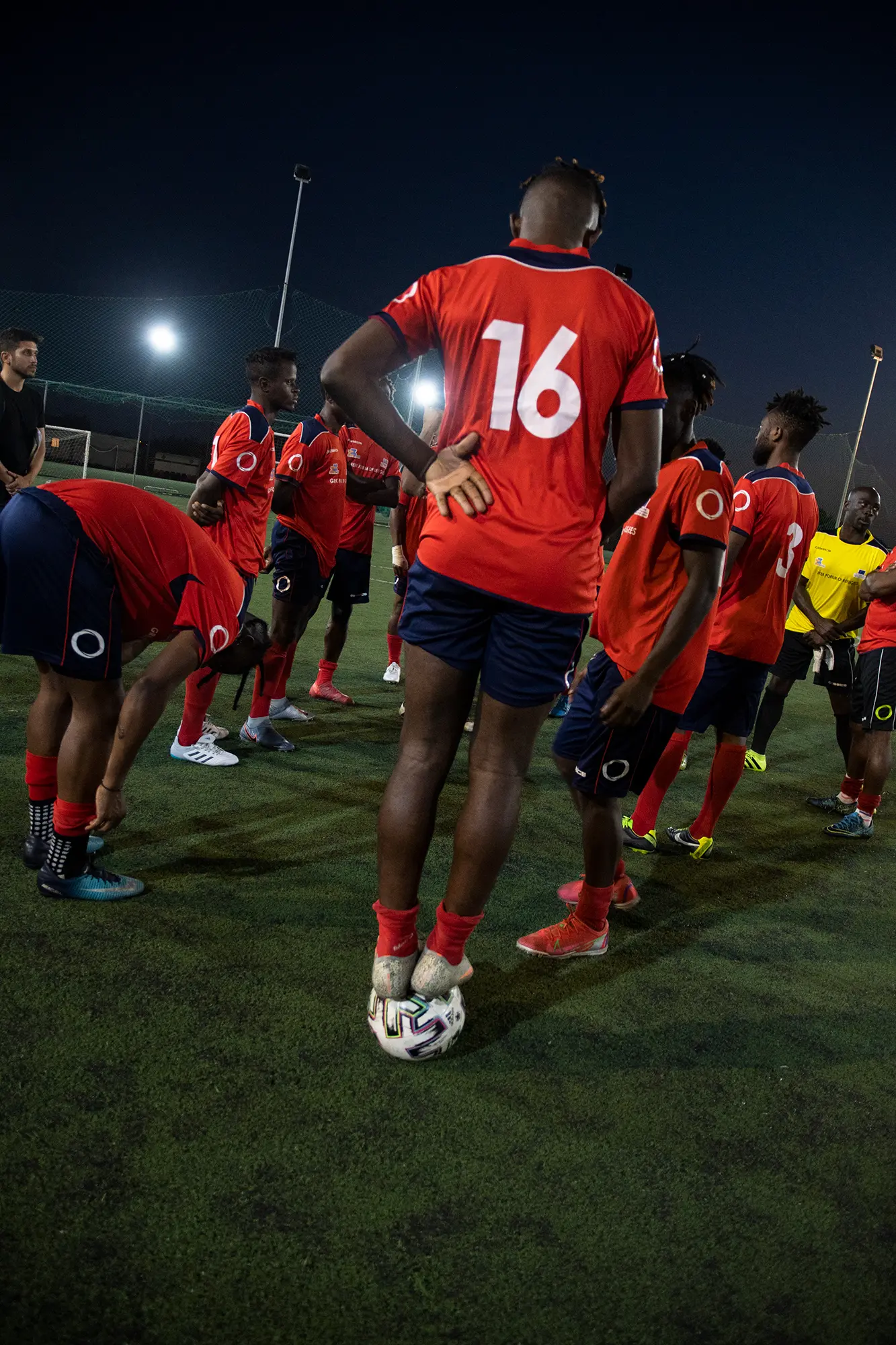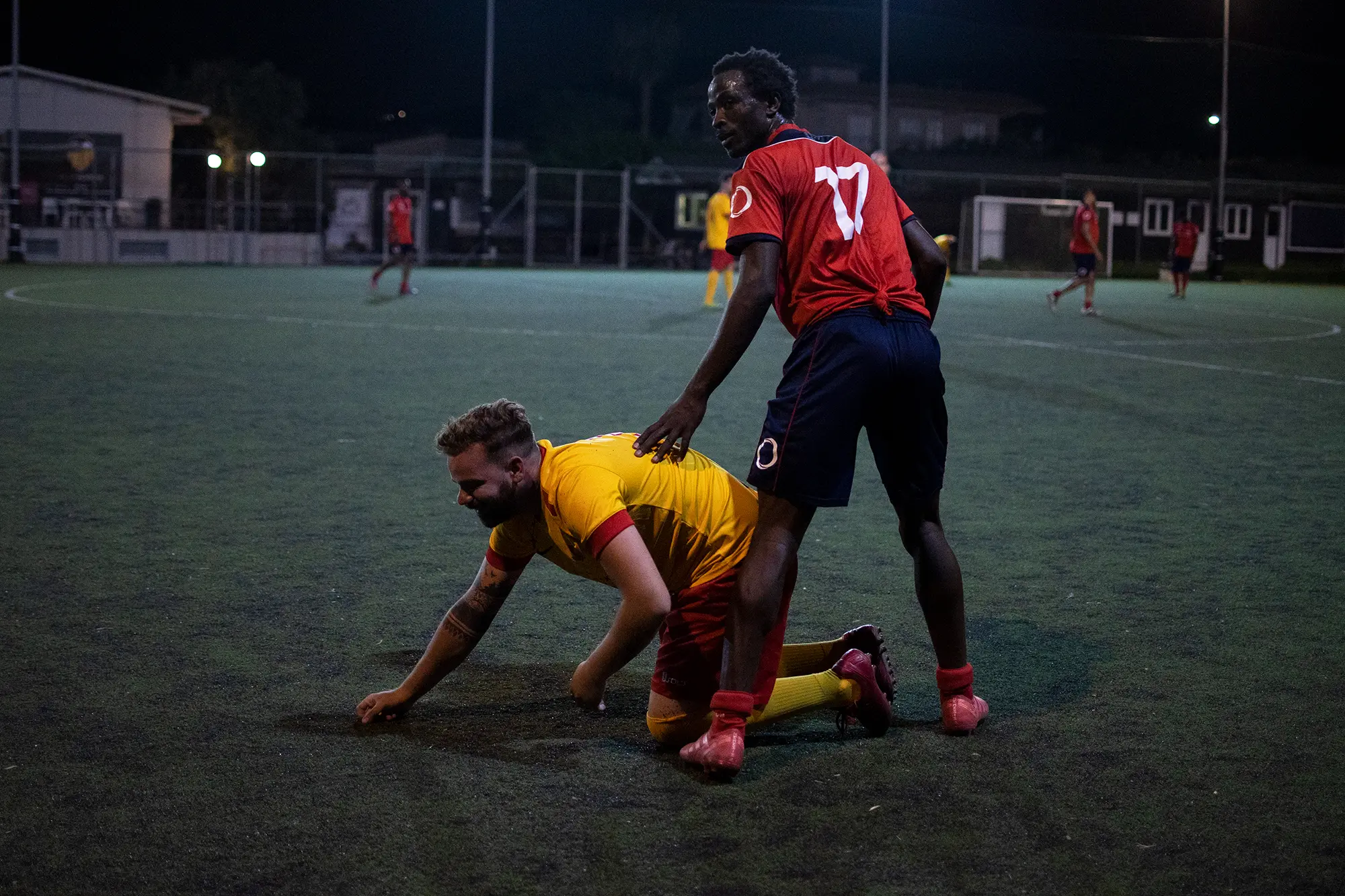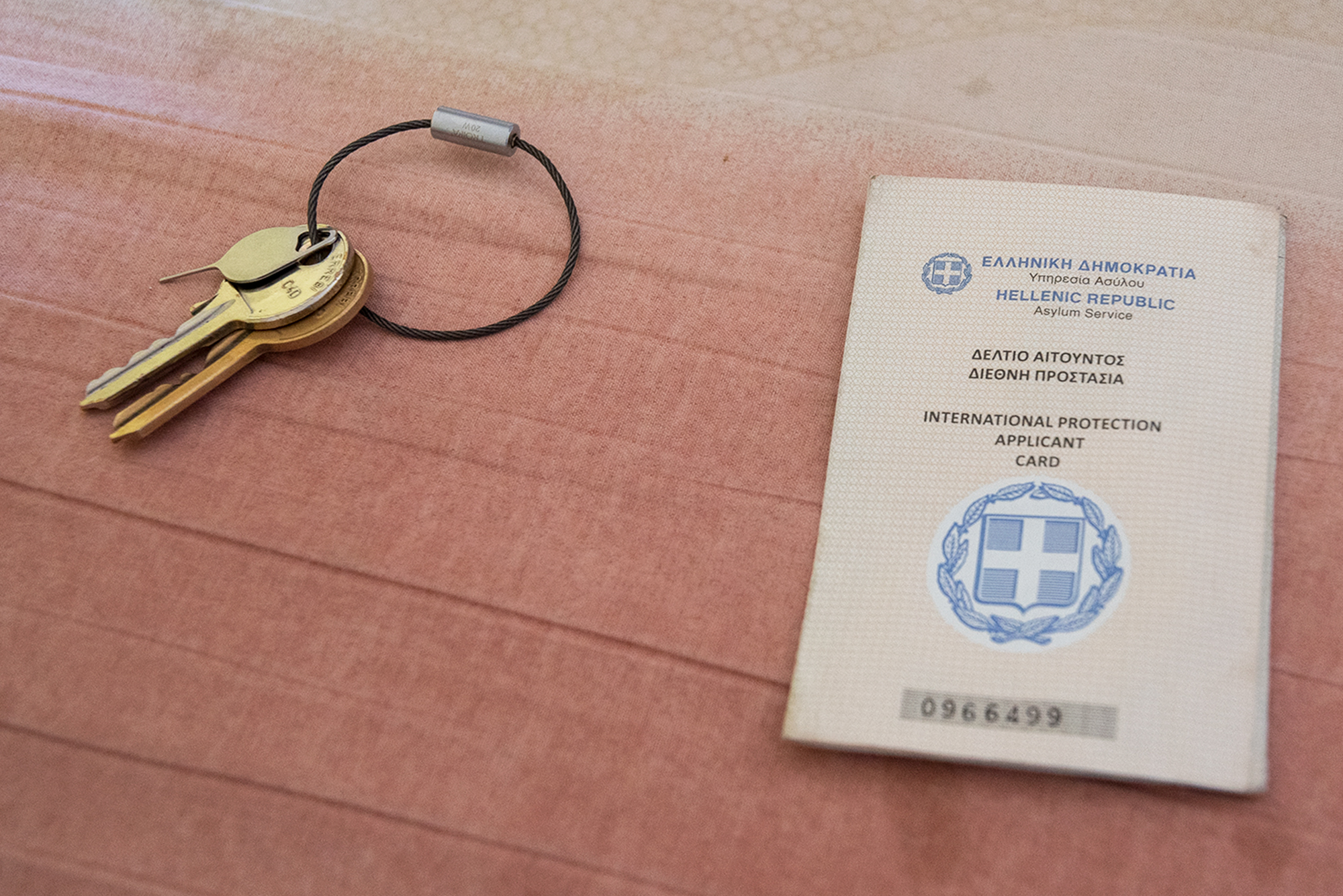Under the lights of a football pitch 10 miles southeast of central Athens, shouts in Greek mix with French and English.
It’s the semi-finals of the Summer Cup for anexartito.com, one of Greece’s oldest active amateur football leagues. And, for the first time, a team by the name of the Greek Forum of Refugees is set to advance to the finals.
“Bravo, guys. Bravo,” Christos Lazaridis, the club manager, yells from the sideline as his players pass the ball in the mid-July heat. A first half riddled with yellow cards and stoppages ended even. But a flurry of goals from the Greek Forum at the start of the second half pushed the team through to a 5-1 win.

As a nonprofit journalism organization, we depend on your support to fund more than 170 reporting projects every year on critical global and local issues. Donate any amount today to become a Pulitzer Center Champion and receive exclusive benefits!
“When we focused on football and we started to play, the difference was obvious,” Lazaridis told his team after the game. “We’re going to shout. The city will hear us today.”
The Greek Forum of Refugees is unique to anexartito.com – it’s the only team made up of migrants and refugees in the league. Most of the players come from Nigeria, Cameroon, Congo, Ivory Coast and other African countries. Other players from Afghanistan and Iraq train with the team.
In their third year in the league, the Greek Forum is 12-0 on the season. But for many players, the team means more than football and a victorious record. The club, team officials say, represents all refugees and serves as a way for migrants to gain recognition and respect. “If you look at this team, it’s not just about team,” Jerry Bolum, the club’s captain, said. “This is the only way we can express ourselves.”
Bolum, 30, migrated from Nigeria to Greece in 2008 for what he called a better life and an opportunity to continue playing football. He’s been with the team since the start, and says the club has developed into a way to give a voice to a group of people who largely lack representation in Greece.
“We don’t see ourselves like migrants,” Bolum said. “We don’t see ourselves as minor. We see ourselves as we can do it.”
“The minute you begin to see yourself as a migrant, you see yourself as a minor,” he added. “You won’t have the voice to speak. But when you see yourself as equal, you have the right to speak, and you have the confidence to speak.”
‘When we win matches, we gain respect’

The club is named after a grassroots self-advocacy organization established by refugees in Athens in 2010. The group aims to help migrants and stateless people support themselves and includes a network of mental health, political inclusion and advocacy programs.
During the pandemic, for example, a group of migrants made masks for those who needed them as part of a “talent and sustainability” effort.
The football club began as a social inclusion-through-sports initiative in 2018. When Lazaridis, who is communications director for the organization, visited the program in September that year, he saw “seven kids and no coach just kicking a ball.”
“Believe it or not,” he said, “I saw potential.”
The group grew to 70 people, with some traveling from refugee camps hours away to participate in training. The core team of about 20 men played their first game in anexartito.com in February 2019.
“The guys (were) super excited,” Lazaridis said of their first match, which ended in a 1-1 draw. “They cannot imagine that every week we will have a match.”
Greece is considered a gateway to Europe for migrants coming from the Middle East and parts of Africa. Since 2015, hundreds of thousands of people have passed through Greece to seek asylum elsewhere. Data from the Ministry of Migration and Asylum show about 89,000 people received international protection in Greece between January 2016 and May 2021.
While many Greeks initially welcomed refugees when they first began to arrive in large numbers more than six years ago, those sentiments have changed, according to advocacy and aid groups. Migrants have become victims of xenophobia and discrimination.
The Greek Forum of Refugees Football Club hasn’t avoided that experience of prejudice.
Lazaridis said he initially faced pushback from people in the central Athens district where the team practices. People in the area had “traditional issues” with migrants and refugees, he said, and called non-stop with complaints. “Why do you have so many foreigners?” they asked.
After knocking on every door in the neighbourhood, and, in one instance, bringing two elderly women to the field to “see the training and see there is nothing wrong,” Lazaridis said he was able to convince the locals that the team was not a negative presence.
He argued that the team was a positive gain.
“There’s just young people that have this craving for life,” he told them, “and they want to play football. Look at them. Look how happy they are.”
Now, the team wants to convince the rest of Athens. And they have their sights set on the league championship, tentatively set for late October.
“When we win matches, we gain respect,” Lazaridis said. “Because they don’t see foreigners. They don’t see refugees, asylum seekers, migrants. They see skills, they see quality, they see talent, they see the personality as (it) is.”
‘When I’m with these guys, I’m happy’

A turning point for the club came in 2019, when club officials noticed African and Afghan members exchanging threats in the team’s WhatsApp group. Lazaridis had a stern talk with the team, he said, and emphasized the importance of respect and support.
“If they are disciplined, if they are organized, if they have respect for each other,” Lazaridis said, “they are able to gain access to the labour market, they are able to work everywhere because they have skills. They are able to interact with every social group.”
“I have to empower them,” he added. “Stand on your feet and defend yourself. The team teaches respect. It’s the only way to tackle discrimination.”
And so the team also plays for one another.
Before the semi-final match, players lounged on picnic tables just outside the field. At one table, a group of six players debated whether Tottenham Hotspur striker Harry Kane had better ball skills than Atlético Madrid’s Luis Suárez. Next to them, a handful of other players talked about style. They laughed as one player asked another why he was wearing sunglasses at 9pm.
“The team has given me positivity,” said Nkwocha Chinonso Nelson, Nigerian-born, who has lived in Greece for 12 years. “It has given me many things – and responsibility at the same time.”
“When I’m with these guys, I’m happy,” he added. “We jeer, we laugh at each other, we mock each other. But we don’t fight each other. So the team means a lot to me.”

Nelson said life as an immigrant in Greece is difficult. The 30-year- old came to Athens after spending time in Dubai, Saudi Arabia, the Maldives, and a number of other countries, as he tried to break into the world of professional football. Each time, trouble with proper documentation or money hampered his plans.
He eventually got a job as a club DJ — “I had no choice than to find something to do,” he said — and has supported both himself and his mother and sister back in Nigeria that way for eight years.
“There are people that came [to Greece] and have higher hopes, higher dreams,” Nelson said. “And when they come, they see the way things are. Their dreams are shot down. They start to see reality, and before you know it, time goes.”
A number of Greek Forum players have left the country over the years due to similar troubles. One player, who left Greece last year for Germany and Holland, had multiple semi-pro offers. But trouble with his asylum status prevented him from taking up those opportunities.
Those players, however, still keep in touch with the team, which many of the players have described as a family.
“We did it for them,” Bolum, the captain, said after the Greek Forum’s semi-final win. “When they were leaving, they told us we are leaving, but the spirit is still there. So they’re here with us.”
Others see the club as the only way to pursue their dreams.
Evans Odudu Godspower, aged 20, is midfielder from Nigeria who came to Greece in 2019 to play football. Like some others, problems with his documents interfered with a semi-pro deal, and the coronavirus pandemic postponed other potential moves.
“For a lot of us, this is actually our future. This is our dream,” Evans said. “Nobody believed in us from the very beginning. Some guys on this team have spent years in Greece trying to make something for themselves. But there were no opportunities.”
“This team was like a gold mine,” he added. “It gives a lot of us the opportunity to prove ourselves, prove our talent, show the stuff we are made of. It was like a saving grace.”
Talking for the voiceless

Lazaridis has big plans for the team. He wants to expand the club into an academy, not for refugees, but for everyone. “The key word is inclusion,” he said. And, in future, he hopes the team can join a semi-pro league.
Funding is a major roadblock for the Greek Forum of Refugees. Lazaridis pays for the team’s water and transportation out of his own pocket. The club relies on donations to pay league fees, referees and other expenses. They’ve set up an online fundraiser to cover costs.
“At this moment, it seems like utopia,” Lazaridis said of his plans. “But if you don’t chase utopia, what should you do?”
On that hot day in mid-July, the players, team photographers and supporters lined up at midfield for a group picture after their semi-final win.
As the team walked to their respective cars, some of the players chatted about plans for the night. The coach, a former professional footballer himself, warned them not to stay out too late, as they had training early the next morning.
Under the lights at the centre of the pitch, Bolum reflected once more on the team’s significance. “I just want everybody to know that we exist. We are talking for the voiceless. We are playing for this,” he said, patting the name “Greek Forum of Refugees” printed on his red jersey.
“We play for everybody. We even play for Greece.”






